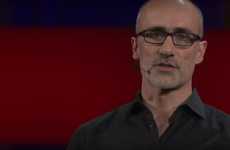
Need Inspiration?
Get inspired by 4,000+ keynote speaker videos & our founder, a top keynote speaker on innovation.
Ione Wells' Talk on Sexual Assault Unfurls How Its Reacted to Online
Riley von Niessen — December 15, 2016 — Keynote Trends
Ione Wells, a writer and activist, describes her own story in her talk on sexual assault. She tells her audience that she had been out with friends in London the night that it happened, celebrating a birthday and rekindling old connections.
When heading back home, she was unexpectedly attacked, with her house visible from where she was. Afterwards, she dealt with feelings of helplessness and shame, which she began putting into writing as a means of dealing with it. She ended up writing an open letter to her attacker, telling him not only how his horrific actions have damaged her, but also everyone that makes up her personal community. Despite this, she tells him that he will never be able to make her live in fear.
The letter was eventually published in Ione Wells' student paper, which she promoted with the hashtag #NotGuilty in reference to the victim blaming that can result from a sexual assault. Not long after it went online, the letter went viral and connected survivors from all over the world, with the hashtag turning into a campaign.
While its viral nature resulted in empowerment for many, Ione Wells realized that the way in which it was being perpetuated by the media became problematic. In a hyper-connected world, people were quick to draw misconstrued conclusions, thinking that if unveiled a simple solution or even believing that Ione Wells had lied about the entire encounter to "push her feminist agenda of man-hating."
With her talk on sexual assault, the writer and activist exposes the power and reach that her message gained because of online platforms. In addition, she asks her audience to take a moment to consider their actions before reacting online -- thinking not only of what they can do, but what they cannot do.
When heading back home, she was unexpectedly attacked, with her house visible from where she was. Afterwards, she dealt with feelings of helplessness and shame, which she began putting into writing as a means of dealing with it. She ended up writing an open letter to her attacker, telling him not only how his horrific actions have damaged her, but also everyone that makes up her personal community. Despite this, she tells him that he will never be able to make her live in fear.
The letter was eventually published in Ione Wells' student paper, which she promoted with the hashtag #NotGuilty in reference to the victim blaming that can result from a sexual assault. Not long after it went online, the letter went viral and connected survivors from all over the world, with the hashtag turning into a campaign.
While its viral nature resulted in empowerment for many, Ione Wells realized that the way in which it was being perpetuated by the media became problematic. In a hyper-connected world, people were quick to draw misconstrued conclusions, thinking that if unveiled a simple solution or even believing that Ione Wells had lied about the entire encounter to "push her feminist agenda of man-hating."
With her talk on sexual assault, the writer and activist exposes the power and reach that her message gained because of online platforms. In addition, she asks her audience to take a moment to consider their actions before reacting online -- thinking not only of what they can do, but what they cannot do.
2.1
Score
Popularity
Activity
Freshness
















